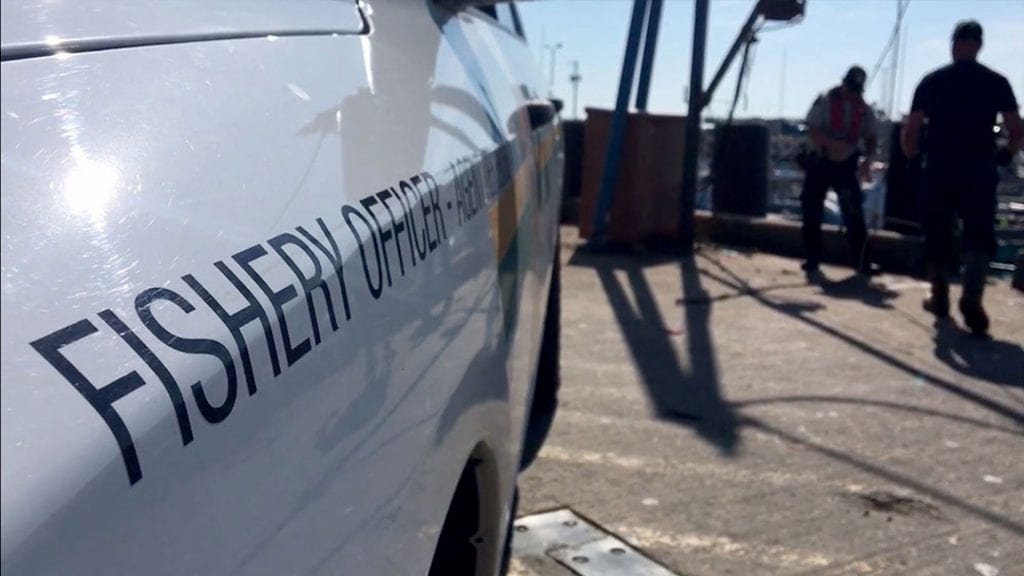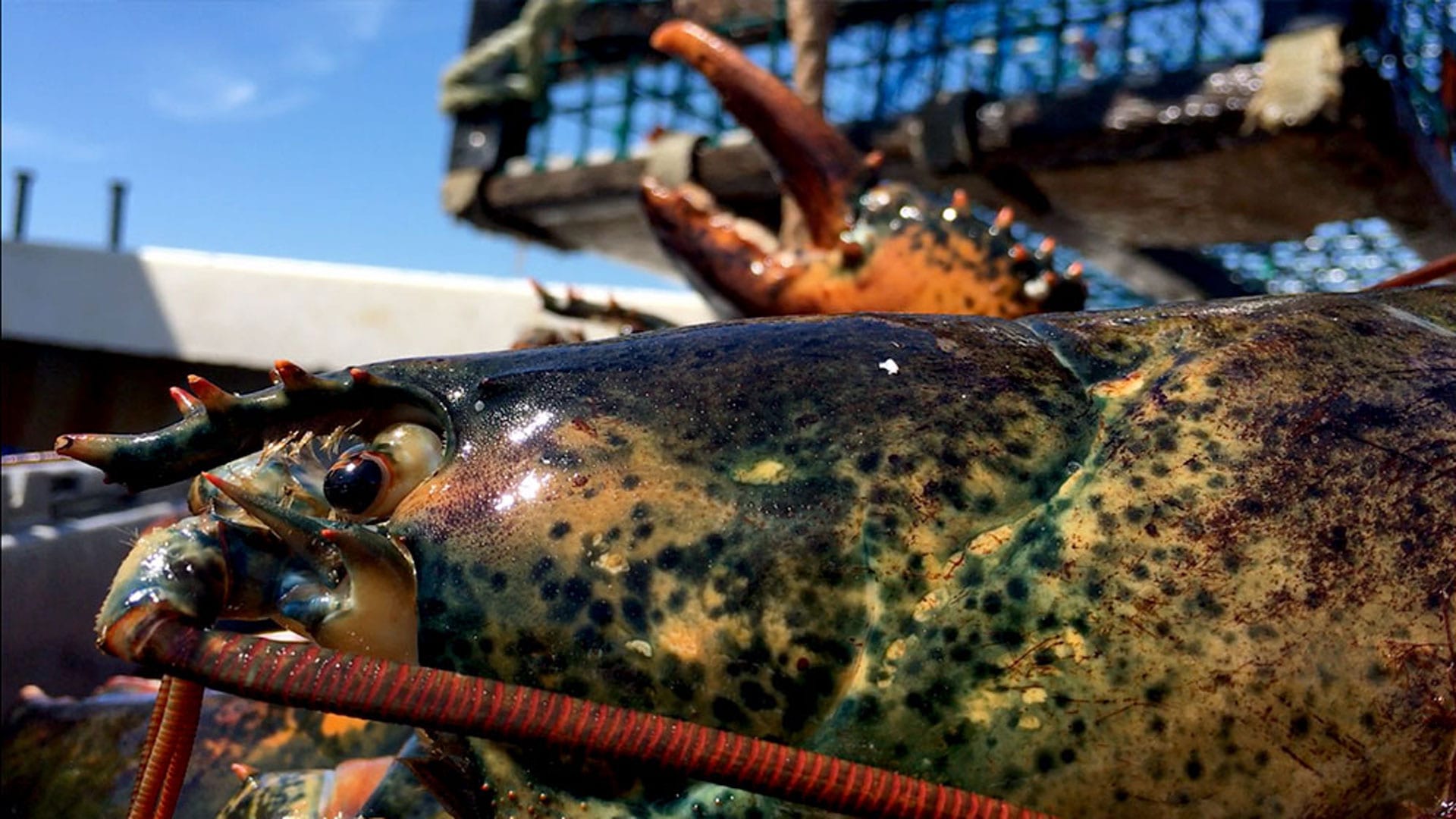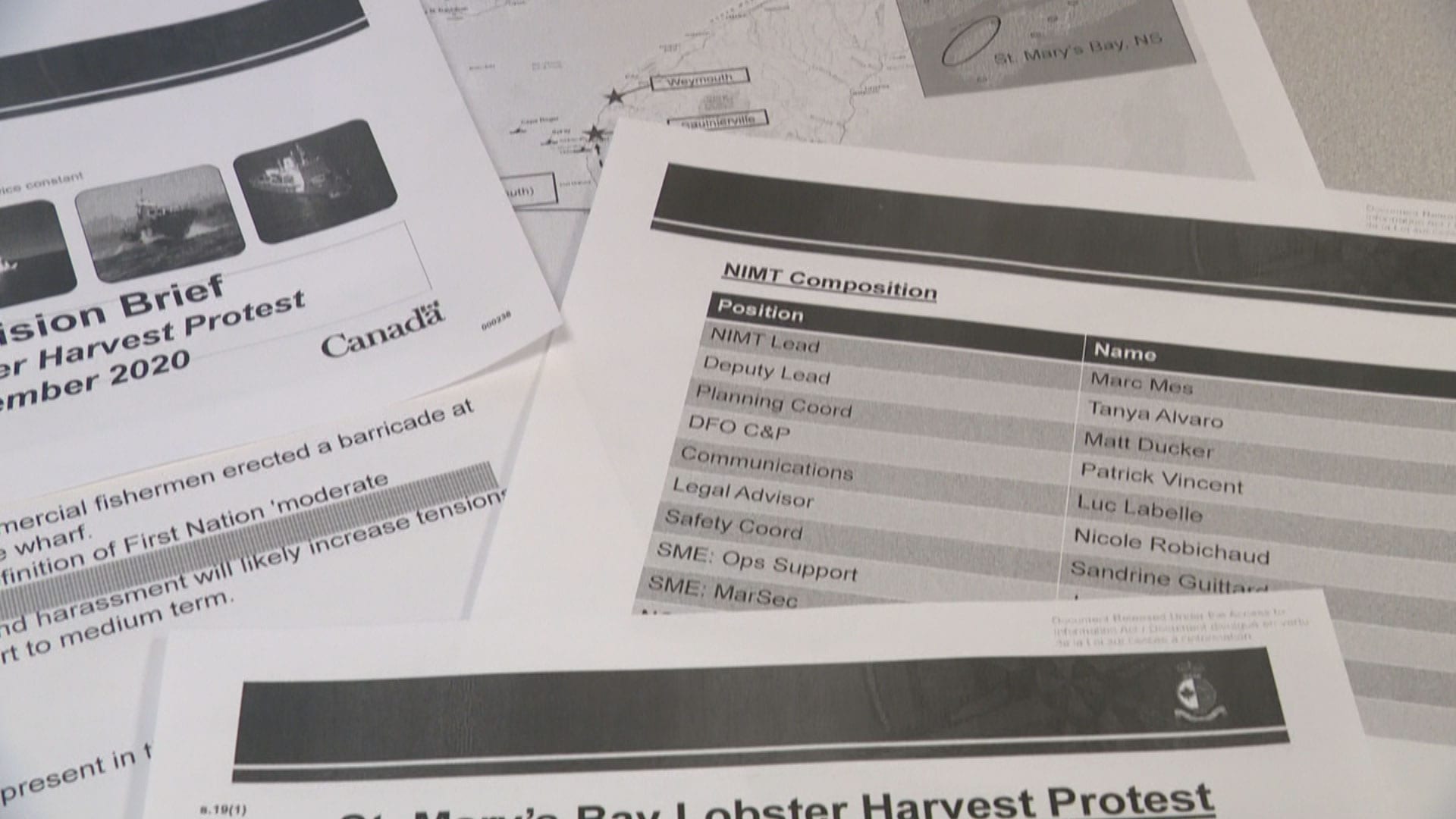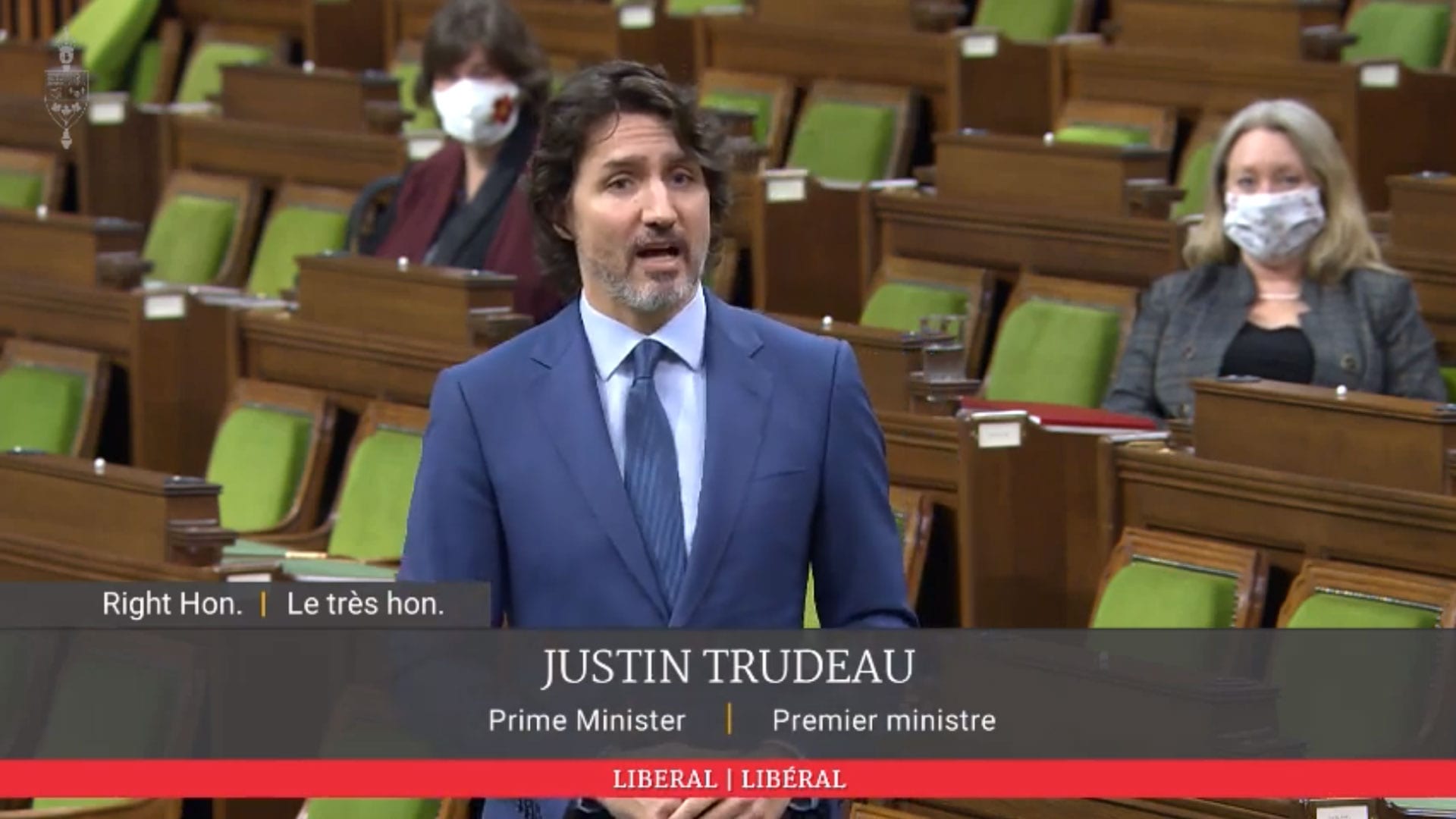
Fishery officers work under DFO's Conservation and Protection branch, which has a mandate to enforce the federal Fisheries Act. Photo: Trina Roache/APTN
Federal government documents reveal how two decades of piecemeal policies on Mi’kmaw fishing rights finally fell apart following the Sipekne’katik First Nation’s launch of a self-governed lobster fishery in southwestern Nova Scotia last year.
Records obtained by APTN News reveal the Department of Fisheries and Oceans (DFO) closely surveils moderate livelihood fishing in order to police it, while simultaneously pursuing policy objectives that have changed very little since the Supreme Court ruled in the 1999 Donald Marshall Jr. case.
It’s policy that has aimed at assimilating First Nations into the existing commercial fishery and created frustration among Mi’kmaw leaders who feel Ottawa continues to ignore the ruling, violate their rights and criminalize harvesters who ought to be protected by treaty.
Sipekne’katik Chief Mike Sack made these points in an urgent letter to Minister Bernadette Jordan, Premier Stephen McNeil and the RCMP on Sept. 11, 2020.
He called on them to “uphold the rule of law” and protect the Mi’kmaw harvesters exercising their treaty right.
But DFO saw it differently.
The department drafted up a response based on its policy that anyone wishing to exercise their treaty right must sign a Rights Reconciliation Agreement, or RRA, to do so.
“We encourage all those wishing to participate in Indigenous fisheries not currently authorized, to work with their community to discuss how these fisheries may be considered as part of these negotiation tables,” explained one media line from Sept. 14.
“While each agreement will differ, the overall goal is to provide clarity and stability in the fishery while recognizing the rights as defined by the Marshall decision.”
The unsigned draft letter bears Jordan’s name at the bottom, but it was written by public servants. It was due for approval on senior officials’ desks by Sept. 17-18.
“I understand that DFO staff in the Maritimes Region and Jim Jones, Lead Federal Fisheries Negotiator, have reached out to you and your staff [redacted] to try and set up a meeting to discuss food, social, and ceremonial fisheries, as well as to discuss moderate livelihood fisheries access via the Rights Reconciliation Agreement negotiation process,” it said.
RRA policy rejected, stalemate ensues
For Sack, the RRA was something he rejected out of hand.
“Most of their letters are all just a waste of paper,” he told APTN on Feb. 10. “There’s no way we’re going to that RRA agreement. It took a little bit of time, but now we’re going towards more self-governing for our community – and we have a right to do so.”
The RRA policy was created in 2017 under the Liberals but is similar to its predecessors: the Marshall Response Initiative and the Atlantic Integrated Commercial Fisheries Initiative.
Under these initiatives, Ottawa would provide gear, vessels and/or cash for First Nations communities to build fishing capacity. DFO would buy commercial licences from retiring fishers, bank them and turn them over to communities.
Ottawa has spent millions under prime ministers Jean Chretien, Stephen Harper and Justin Trudeau.
The programs significantly increased First Nations participation in the existing commercial fishery.

But many leaders have panned and rejected this policy. They argue fishing under DFO rules under Fisheries Act regulations doesn’t uphold the Marshall ruling.
“That’s just not even a conversation we’re going to have with DFO or Canada,” explained Sack. “It’s one of those things where they’re just trying to box you in, and dilute, and make sure that there’s no Indigenous people left in Canada.”
The lowers courts convicted Marshall of three Fisheries Act infractions: fishing for eels without a licence, fishing with an illegal net during a close season and selling fish without a licence.
The high court overturned the convictions based on treaties. Marshall may have violated the Fisheries Act, but he had not broken the law.
“The Fisheries Act is to govern commercial fisheries. We have a right to fish – and our right is outside of that commercial fishery,” said Sack.
“It seems like whatever we do, the government doesn’t respect that right that we have.”
DFO changes approach
Jordan and Sack ultimately met on Sept. 19.
Notes from the meeting are redacted, but it was described as “very cordial and very positive.”
Sack also included a copy of the First Nation’s fish management plan with his letter. The band proactively shared it with DFO in late 2019.
Jordan was asking about these documents two days after the meeting.
“The Minister asked if we had any other fishing plans from FN groups that we should be considering now. If not, have we proactively reached out to get them? An example the Minister gave was [community name redacted],” said a senior advisor via email.
“I believe Sipekne’katik and Potlotek are the only two communities who have submitted draft livelihood management plans this year,” replied Jacinta Berthier, regional director of fisheries management.
“I can confirm that it had not been our practice to solicit these harvesting plans, as we have been focused on the formal RRA process, [sentence redacted].”
In other words, the department had no other option than the RRA process. It puts communities in a position where they may have to resort to civil disobedience.
As a result, DFO focuses greatly on policing, surveilling and spying on First Nations who wish to exercise a constitutional right but may have to violate the Fisheries Act to do so.
Department surveils First Nations’ fishery plans
On Sept. 18, a day after the launch of the fishery, a weekly “Aboriginal fisheries meeting” was held at DFO.
The meeting notes have “Ongoing Issues with Moderate Livelihood” as the top item. It’s something attendees were struggling with.
“The issue of moderate livelihood needs to be address[ed], we need to put a team together and work with our communities to at least begin the discussion,” said a manager at DFO’s Indigenous Relations and Partnership Hub in an email.
“Esgenoopetitj First Nation is creating there [sic] own fisheries management plan,” said the second item on the meeting notes. “Situation continues to be observe and report for now.”
The meeting also discussed Abegweit First Nation in P.E.I, which announced plans to launch a treaty fishery not long after Sipekne’katik launched theirs.
“They are watching what is going [on] in SW Nova Scotia,” said the notes.
The meeting was also “tasked with collecting information on unauthorized fisheries related to current events in SW Nova Scotia on Moderate Livelihood (Who was willing to sign their agreements, etc.).”
“What is the likelihood of seeing more unauthorized fisheries from other communities this year?”

The National Fisheries Intelligence Service (NFIS) took up the question on this same day.
It issued a situation report, or SITREP, that notes which communities support livelihood fishing and want their Marshall rights implemented.
“Some Chiefs and Band Councils from the Gulf region showed support to the unauthorized Lobster fishing activities in SWNS using social media platforms,” said the SITREP.
“The Pictou Landing Chief has expressed on social media her support for the SWNS event, [sentence redacted].”
The next portion, under the heading “Indigenous organizations,” was significantly redacted by the government.
“Based on observations, Esgenoôpetitj First Nation started their fall Lobster Food, Social and Ceremonial (FSC) fishery on 2020.09.09,” the SITREP then said.
“2019.09.17 was the 20-year mark of the Marshall Decision. An event was hosted in Membertou, NS, to celebrate the 20th anniversary and discuss the meaning of moderate livelihood.”
A senior NFIS official explained the approach in an email dated Sept. 22.
“As discussed we ‘Do Not’ take sides, this is not our conflict, we are focused on Fisheries Act violations and or the safety and security of our employees and will report on such, other items outside of this mandate are to be reported to appropriate agencies,” said the chief of intelligence, whose name was redacted.
“We are very good and are all leveraging our local, regional , national and international contacts to bring the full intelligence network together for our mandate and the public safety of all Canadians.”
Sipekne’katik launched the fishery five days earlier.
Commercial harvesters were enforcing the Fisheries Act themselves, resulting in chaos and violence on the water.
Read More:
DFO, RCMP knew violence was coming but did nothing to protect Mi’kmaw lobster harvesters: Documents
Federal government agencies ‘complicit’ in violent attacks on Mi’kmaw harvesters: Chief
“Recent information suggests that the Chief of Abegweit as well as the Chief of Pictou Landing have been travelling to SWNS to support the unauthorized Lobster fishing activities currently taking place,” said another SITREP.
“On 2020.09.18, DFO formally denied Listuguj Mi’gmaq Government (LMG) to use their own fishery management plan which included the authorization to sell their Lobster Food, Social and Ceremonial (FSC) catches,” the document continued.
“The LMG have submitted similar request to sell their FSC catches in the past which have also been denied. The LMG FSC Lobster fishery is scheduled to start today.”
Another large portion of the SITREP was redacted following the mention of Listuguj, which is in Quebec just across from northern New Brunswick.
“Esgenoôpetitj First Nation is currently on their 9th day of fishing Lobster using their own fishery management plan,” said the next unredacted segment.
Fishery officers were also monitoring a redacted location “where Moderate Livelihood Lobster fishing activities took place in the fall of 2019.”
Esgenoôpetitj – now mentioned for the third time by DFO intelligence – may be more familiar to some by its former name: Burnt Church.
It’s where a nearly identical standoff happened in late 1999, immediately following the Marshall ruling.
RRA policy crumbles
Unable to move the needle on the RRA with Sipekne’katik, the department started coming up with something new.
In late November, DFO handed Sack a draft memorandum of understanding that would’ve issued the community a first-of-its-kind moderate livelihood fishing licence.
He hoped it might be a “potentially ground-breaking and historical understanding.”
But he came away disheartened again.
“The problem we are currently facing is the disconnect between the department’s bureaucrats understanding and the evolving nation-to-nation relationship,” he said in an open letter to Prime Minister Justin Trudeau. “As a result, they are continuing to use colonial approaches and colonizing language.”

According to the MOU, the moderate livelihood licence would’ve been issued under the Aboriginal communal licensing regulations of the Fisheries Act.
It would’ve authorized the community to fish 500 traps using tags “validated by DFO.” The catch could then be sold “for the purposes of earning a moderate livelihood.”
It would’ve authorized Sipekne’katik to fish for six months after the signing date while DFO and the community pursued “a lasting agreement on the implementation and exercise of that right in the future.”
For the chief, it was the same policies he rejected from the start – a rehashing of an approach that aimed to assimilate rights rather than implement a legally binding Peace and Friendship Treaty.
“It was three months of lip service if you ask me. We spoke to them a number of times, and we told them at the very first meeting we weren’t going to negotiate our rights, and we weren’t going to fish DFO-issued licences,” said Sack. “They just wasted everyone’s time.”
Following APTN’s reporting on this story, the prime minister was grilled during question period in the House of Commons.
His reply suggests another new approach is in the works, though what it might look like remains unclear.
“We know that this is a situation that has been in place for many, many decades, but it is time to recognize those rights that have been identified for many years but not been fulfilled,” said Trudeau on Feb. 17.
“This is what we are working on now and hope to resolve soon.”









